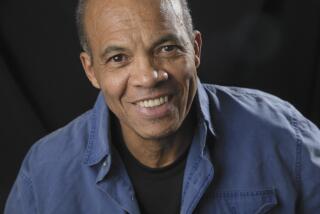Review: Morgan Jerkins ‘This Will Be My Undoing’ is a vital essay collection for the current political moment
Morgan Jerkins’ first book, “This Will Be My Undoing: Living at the Intersection of Black, Female, and Feminist in (White) America,” is a beautiful example of possibility, nuance and passion coexisting, even in our heightened political moment.
In 10 essays, Jerkins doesn’t allow for easy binaries, nor does she heatedly attack or call names, as she explores what it’s like to be a black girl, and later a black woman, in contemporary U.S. society. She writes with single-minded intensity about the complex spaces black girls and women find themselves navigating both in the world and in themselves.
The chapters cover a wide range of cultural criticism, including the author’s experience as one of the few black female students at Princeton and her appreciation of Beyoncé’s “Lemonade,” but there are some points Jerkins makes several times over, because they bear repeating. The focus of these points of tension is the way our society treats black women as inhuman, their bodies consumable or publicly available. Jerkins allows her lens to go deep into contemporary culture, with her essays almost free-associating at times.
She writes with single-minded intensity about the complex spaces black girls and women find themselves navigating both in the world and in themselves.
In “Human, Not Black,” Jerkins tells us about her fascination with Dostoevsky’s books, her visit to Russia, how she felt like a gentrifier in Harlem, her discovery of Sailor Moon, her decision to study Japanese in college and how she was studying abroad in Japan when Trayvon Martin’s killer was acquitted. These seemingly disparate subjects are not so disparate, even though there are moments during the essay when the reader is ejected from one subject and plunged immediately into the next with only a blank space and nary a sentence of connective tissue between.
Yet this associative writing is doing double work: It is a stylistic choice on behalf of Jerkins and, presumably, her editor; it is also exemplifying Jerkins’s ideology regarding black narrative. In “Who Will Write Us,” she writes that her “idea of a black narrative is one that subverts, flips, and undermines rule until that final product cannot be duplicated by anyone other than one with black hands.” I wish that this sentence had come earlier in the book, because it changed the way I approached its structure and allowed me to see the essays’ internal logic and organization with a fresh eye.
Jerkins allows her lens to go deep into contemporary culture.
Two essays in the book are structured as lists, and they are mirror images of one another. The first, “How to Be Docile,” addresses mothers of black girls, and reminded me of Jamaica Kincaid’s story “Girl” and its particular brand of brutality. “When your black girl child exits your womb,” Jerkins writes, “and you hear her loud wailing, savor and remember it for as long as you can. That’s the loudest the world will ever allow her to be in a room where multiple people are present.” The rest of the essay continues in this vein, and it is heartbreaking. The emotional and natural response to it is the more uplifting “How to Survive: A Manifesto on Paranoia and Peace,” in which Jerkins urges black girls and women to take care of themselves, to believe their experiences, to “see the ancestors’ blessing upon [their] brow,” to remember that they “still exist in this world, and that should be a source of pride, not shame.”
At the end of the book’s opening essay, “Monkeys Like You,” Jerkins writes that the book is not “about all women, but it is meant for all women, and men, and those who do not adhere to the gender binary.” For good measure, she addresses the reader directly: “It is for you. You.” Jerkins knows her audience, and it’s a clever insertion she will be able to point to if there is any angry white feminist backlash against the book: “Look,” she’ll be able to say, “I said upfront that it is not about but rather for you.” It’s unfortunate that such a security measure is needed, but it is also a nod at the reality within which Jerkins is writing, a reality where many readers — and most editors, agents and book critics (myself included) — are white.
This book really is meant for many of us, especially right now. A black writer and critic I know posited that the book is too concerned with whiteness, with falling short of it, trying to avoid it, walking around it, aspiring to it, measuring the self against it. Perhaps that is true for some black readers. As a white Jewish one, I can speak only to my experience, which is that this book feels incredibly important for white people to read (and, I’d venture, for nonblack people of color as well, and for men, all men, in general), because there is a brutal honesty Jerkins brings to the experiences of black girls and women that is vital for us to understand as we strive toward equality, toward believing women’s voices and experiences, and toward repairing the broken systems that have long defined our country.
Masad is an Israeli-American fiction writer and book critic, and is currently a PhD candidate at the University of Nebraska-Lincoln.
Morgan Jerkins
Harper Perennial: 272 pp., $15.99 paper
More to Read
Sign up for our Book Club newsletter
Get the latest news, events and more from the Los Angeles Times Book Club, and help us get L.A. reading and talking.
You may occasionally receive promotional content from the Los Angeles Times.






